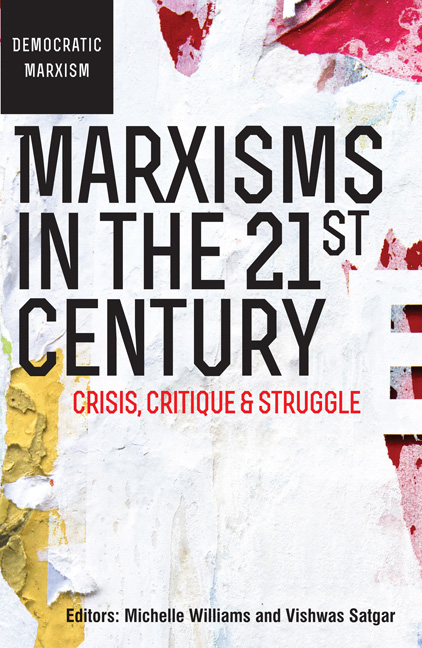Book contents
- Frontmatter
- Miscellaneous Frontmatter
- Acknowledgements
- Contents
- Acronyms and Abbreviations
- Introduction
- PART ONE DEMOCRATISING AND GLOBALISING MARXISM
- Chapter 1 Marxism and Democracy: Liberal, Vanguard or Direct?
- Chapter 2 Marxism after Polanyi
- Chapter 3 Transnationalising Gramscian Marxism
- PART TWO MARXISM AND LEFT POLITICS
- PART THREE CRISES OF MARXISM IN AFRICA AND POSSIBILITIES FOR THE FUTURE
- Conclusion
- Contributors
- Index
Chapter 2 - Marxism after Polanyi
from PART ONE - DEMOCRATISING AND GLOBALISING MARXISM
Published online by Cambridge University Press: 21 April 2018
- Frontmatter
- Miscellaneous Frontmatter
- Acknowledgements
- Contents
- Acronyms and Abbreviations
- Introduction
- PART ONE DEMOCRATISING AND GLOBALISING MARXISM
- Chapter 1 Marxism and Democracy: Liberal, Vanguard or Direct?
- Chapter 2 Marxism after Polanyi
- Chapter 3 Transnationalising Gramscian Marxism
- PART TWO MARXISM AND LEFT POLITICS
- PART THREE CRISES OF MARXISM IN AFRICA AND POSSIBILITIES FOR THE FUTURE
- Conclusion
- Contributors
- Index
Summary
What should we do with Marxism? For most the answer is simple. Bury it! Mainstream social science has long since bid farewell to Marxism. Talcott Parsons (1967: 135) dismissed Marxism as a theory whose significance was entirely confined to the nineteenth century – a version of nineteenth-century utilitarianism of no relevance to the twentieth century. Ironically enough, he penned these reflections in 1968 in the midst of a major revival of Marxist thought across the globe – a revival that rejected Soviet Marxism as a ruling ideology, a revival that reclaimed Marxism's democratic and prefigurative legacy. The revival did not last long but suffered setbacks as revolutionary hopes were vanquished by repression and dictatorship and then by market fundamentalism. With the final collapse of the Soviet order in 1991, and the simultaneous market transition in China, the gravediggers pronounced Marxism finally dead and bells tolled across the world.
Facing such anti-Marxist euphoria, the last hold-outs often appear dogmatic and anachronistic. Marxists have, indeed, sometimes obliged their enemies by demonstrating their religious fervour in tracts that bear little relation to reality, defending Marxism in its pristine form, revealed in the scriptures of Karl Marx and Friedrich Engels. The disciples that followed Marx and Engels – Lenin, Plekhanov, Trotsky, Bukharin, Luxemburg, Kautsky, Lukács, Gramsci, Fanon, Amin, Mao – were but a gloss on biblical readings of origins. Today's epigones do not place Marx and Engels in their context, as fallible beings whose thought reflected the period in which they lived, but as Christ-like figures and thus the source of eternal truth. In their view the founders can speak no falsehood.
Adopting neither burial nor revelation, a third approach to Marxism has been more measured. Many in the social sciences and beyond have appropriated what they consider salvageable, which might include Marxism's analysis of the creative power of capitalism, the notions of exploitation and class struggle, the idea of primitive accumulation, or even Marxist views of ideology and the state. These neo-Marxists and post-Marxists often combine the ideas of Marx and Marxism with those of other social theorists – Max Weber, Émile Durkheim, Michel Foucault, Pierre Bourdieu, Jürgen Habermas, Simone de Beauvoir, Catharine MacKinnon and so on.
- Type
- Chapter
- Information
- Marxisms in the 21st CenturyCrisis, Critique & Struggle, pp. 34 - 52Publisher: Wits University PressPrint publication year: 2013



